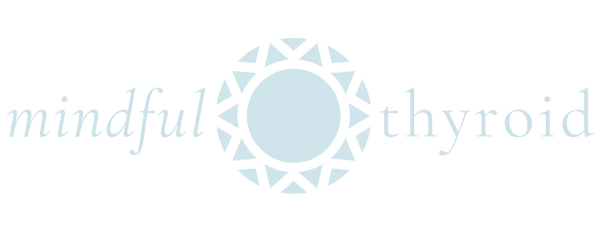

Mind Vs. Body
At 17, I started experiencing thyroid issues, swinging from hypo to hyper symptoms every few months. It took 6 years to get diagnosed properly and start any treatments. During a time when my friends were worrying about what college to attend or latest movie to see, I was worrying about whether I would have enough energy to make it to work (I was sleeping 15 hours a day), if my hair would ever stop falling out or if I would be able to eat without feeling sick each night.
Every year it seemed a new symptom or issue popped up (even after thyroid medications) that I would try to fix. It was like playing whack-a-mole trying to figure out why my body was attacking me. I’d get one thing under control, or so I thought, and then another symptom would appear, making me feel like a complete failure.
I didn’t have the right mindset then. I didn’t know what I was getting into really. Within about a year it became apparent that doctors would be of little help and I would be on my own with these issues. I struggled to get my body to work with what my mind wanted and my mind to stop berating my body for not cooperating. This internal struggle catapulted me into emotional sugar cravings to try and soothe the discomfort. I know now that only led to worsening gut issues with candida overgrowth and SIBO bacterial overgrowth.
Strength Comes From Struggle
It took many years before I realized that during my struggles, I was building strength, courage and a better mindset along the way. I started to realize there was a lesson to be learned during each struggle or issue that came up. I learned to ask myself what I needed in order to get through the struggle and then I changed my mindset to achieve that.
For example, when I was afraid of having more panic attacks (as happens when you’re experiencing hyper thyroid swings) I asked myself what I needed in order to feel stronger and less afraid. I needed to feel in control so I started doing things that helped me feel like my mind and body were working together like with yoga and light exercise. Or I would use affirmations to remind me that I have internal strength. Similar to affirmations, using visualization of who you want to be can help you create the traits and habits of that desired version of yourself.

"What you desire is deliberately placed out of reach so that you can become the person it takes to obtain it."
One of my favorite quotes is by Mastin Kipp and it reminds us that through our struggles we are becoming the person we need to be in order to achieve our goals. This was so relevant to my healing journey. At 17 I was nowhere near the person I needed to be in order to heal autoimmune disease and gut issues. I wasn’t willing to change enough back then.
When I realized the things I wanted in life were getting further from my reach due to my health issues, I re-evaluated who I was and what needed to change. That’s when I really began my healing journey and it was much more about becoming a better version of myself than just eating better or finding the right diet (which was also important). Through my struggles I realized the things I thought I wanted were not really what I valued. I valued my health, friendships and quality of life and that led me to become a Nutrition Therapist to help other women break through their barriers so that they can heal.

Over the course of my healing journey I found success in reducing my Hashimoto’s thyroid antibodies, reducing my medication dosage, eliminating severe SIBO overgrowth and candida overgrowth, as well as eliminating IBS (symptoms and markers on tests), sugar cravings, depression and anxiety.
While none of this was easy, I did get stronger and more resilient each time I faced a new issue to overcome. Below are my practical tips to help you appreciate the struggle in your healing journey.
Practical Tips
1. Set Reasonable Expectations
Build your mindset by setting a reasonable goal and timeframe for achieving the goal. Healing autoimmune disease doesn't happen in 30 days or 3 months like many books or programs promise. You can reduce symptoms, but it can take a lot more work to really heal. Be realistic and give yourself 6 months, a year or even 2-3 years to really dig deep and make necessary lifestyle, diet and mindset changes. Setting unrealistic expectations at the start of your journey can set you up to feel like a failure if you don't meet those expectations.
2. Evaluate Your Success
Create markers that define success to you so you'll know when you meet them and can celebrate. For example, one success marker I created was to not have stomach pains after eating. When I achieved that goal by going completely gluten free and resolving my nightly stomach pains, I made sure to celebrate. It can get overwhelming focusing on the issues/symptoms and you don't want to miss out on all the positive changes that are occurring at the same time. Celebrate your successes to help you stay motivated and appreciate the hard work you've put in.
3. Become Your Own Hero
You are the hero of your story! In any good book the main character follows a hero's journey. That journey is full of obstacles and struggles the character must overcome to succeed and achieve greatness. It would be a very boring book if the hero easily got everything she desired in the first few chapters. Think of your journey as the hero's journey. How is your story inspiring others? Where are you at in your story? What lessons are you being asked to learn to overcome your obstacle? When it feels the most difficult is when you're being asked to make the greatest change that will put you closer to achieving your ultimate goal.
4. Recognize Personal Growth
During your healing journey you will grow as a person and develop new character traits or strengthen ones you already have. Reflect on and practice gratitude for these changes. They are gifts during your healing journey that come unexpectedly when you're focusing so much on your main goal. I realized how I became a more patient person, resilient, forgiving, kinder to myself and stronger mentally than when I began. This was a beautiful realization that even though I may not have my health exactly where I want it yet, I have grown so much as a person and strengthened character traits I was lacking before.
5. Celebrate Your Influence
By adopting a healthier lifestyle and diet to heal your own health issues, you'll ultimately have a positive effect on others when they see you making changes. By helping others, whether intentional or not, you are putting forth good vibes and positivity in the world and we always need more of that. Celebrate your positive influence and recognize your powerful impact in shaping others' lives. By making changes to my own diet, I have also helped my friends and family lose weight and eat healthier. This motivates me to keep making positive changes to my own health. In my experience, motivation is much more effective when it comes from positive intentions rather than negative ones.
What lessons have you learned in your journey? Share in the comments.




